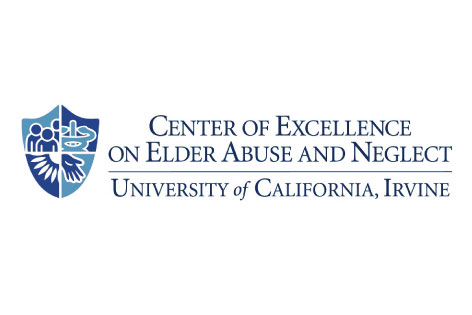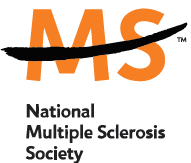 |
Center of Excellence on Elder Abuse
The First of its Kind: Elder Abuse Forensic Center of Orange County, CA
Launched in May 2003, the Elder Abuse Forensic Center has changed the way elder abuse cases are investigated through an unprecedented collaborative process.
The Forensic Center is staffed by professionals from legal, medical, social services and law enforcement agencies. Forensic Center members conduct case reviews; check in-home medical and mental status; do evidentiary investigations; tape victim interviews; educate; consult and do research.
The collaboration brings these experts together to better understand, identify and treat elder abuse, determine more efficient ways to successfully prosecute elder abuse cases and support the prevention of elder abuse through greater awareness and education among those professionals who work with older and disabled adults.
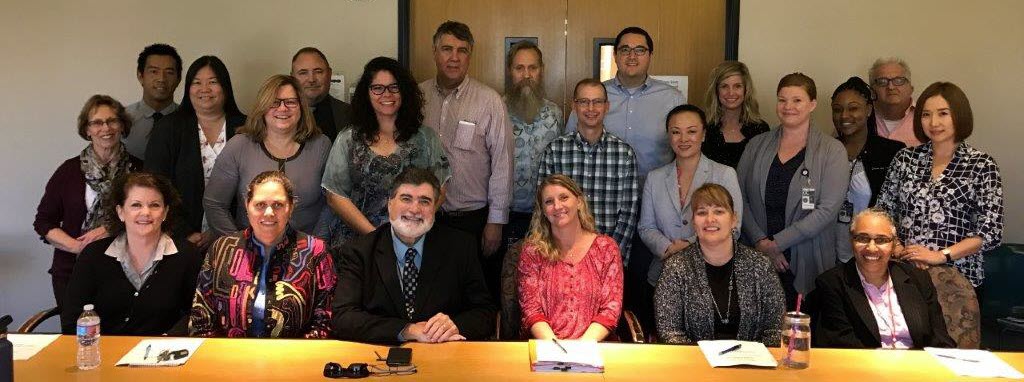
The United States Department of Justice, Office for Victims of Crime honored the Elder Abuse Forensic Center of Orange County with a 2011 Award for Professional Innovation in Victim Services.
The Orange County Elder Abuse Forensic Center houses professionals from the following local agencies:
A HISTORY OF EXCELLENCE
DIVISION OF GERIATRICS AND GERONTOLOGY, UNIVERSITY OF CALIFORNIA, IRVINE SCHOOL OF MEDICINE
Milestones in the Development of the Center of Excellence on Elder Abuse and Neglect, University of California, Irvine
|
The Vulnerable Adult Specialist Team is established as part of theProgram in Geriatrics at the University of California, Irvine. Program pairs medical doctors and psychologists with county social service professionals to handle cases of suspected elder abuse. |
|
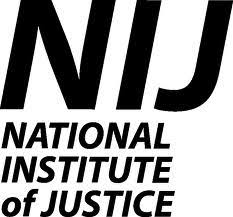 |
Program in Geriatrics receives grant from the National Institutes of Justice to undertakethe first ever study of bruising in the geriatric population. |
|
The world’s first Elder Abuse Forensic Center is established with a grant from the Archstone Foundation. The Forensic Center is staffed by professionals from legal, medical, social services, and law enforcement agencies who conduct case reviews, in-home medical and mental status, and evidentiary investigation. The collaboration brings these experts together to better understand, identify and treat elder abuse, determine more efficient ways to successfully prosecute elder abuse cases and support the prevention of elder abuse through greater awareness and education among those professionals who work with older and disabled adults. |
 |
|
|
The UniHealth Foundation gives a grant for the Center of Excellence to establish an Elder Abuse Training Institute. Elder Abuse Investigations Peace Officer Standardized Training established and presented to an inaugural class of law enforcement officers. |
|
NY Times article: “Forensic Skills Seek to Uncover Elder Abuse” (September 27, 2006) highlights work of the Elder Abuse Forensic Center. |
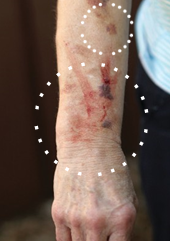 |
 |
Geriatric Pocket Doc published. A field guide for non-physicians, GPD is used by social workers, law enforcement, attorneys, judges, and aging services providers. |
|
National Institutes of Justice fund two research studies on: “People with Dementia as Witnesses to Emotional Events” and “Coroners’ Investigations of Suspicious Elder Deaths.” Elder Death Investigation for Coroner/Medical Examiner Investigators course first offered. |
 |
|
|
The Center organizes and hosts a Special All-day Track on Elder Abuse at the American Society on Aging conference in Las Vegas, NV. The Center presents an Elder Abuse Symposium at the annual American Geriatrics Society conference. |
|
The Forensic Center reviews its 800th case of elder abuse. |
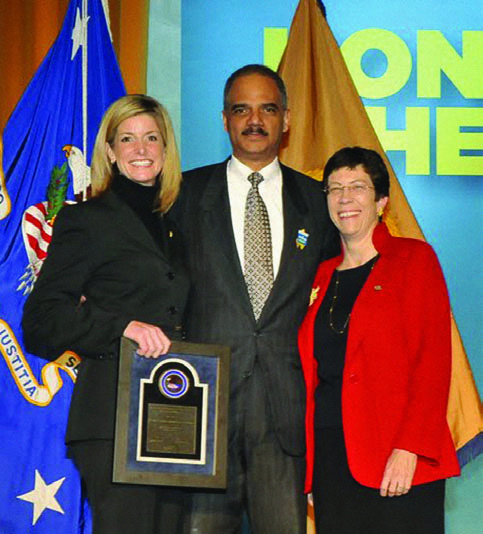 |
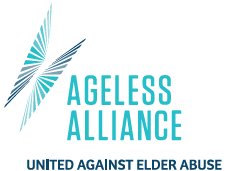 |
Formation of Ageless Alliance (www.agelessalliance.org) announced at the White House on World Elder Abuse Awareness Day. |
Continued Evolution: The Law Enforcement Edition
The Orange County Elder Abuse Forensic Center strives to constantly improve and define its structure and business processes to be more responsive to its member agencies. This is the case in working with such an important partner as law enforcement. With 22 separate contacts for local law enforcement services in the County, the team set out in 2014 to devise a meeting structure that would be more aligned with the way cases are worked by police officers and detectives/investigators. While medicine and social services are more process oriented, law enforcement focuses on facts and evidence. These approaches, although complimentary, can affect meeting dynamics – in particular the level of tolerance for storytelling.
To bridge the gap, Officer Cherie Hill from the Anaheim Police Department (a long-term member of the Orange County Elder Abuse Forensic Center) developed the idea of dedicating one meeting per month to review cases referred to the Forensic Center exclusively by law enforcement. In order to highlight the law enforcement aspect of this meeting, it is held at the Orange County Family Justice Center and co-facilitated by Officer Hill and Dr. Gibbs (Director of the Forensic Center and Chief of Geriatrics at UCI). In the last four years, attendance by police officers and detectives from different jurisdictions in Orange County has increased averaging 6 to 10 law enforcement representatives at each monthly meeting.
We call this meeting, the Orange County Elder Abuse Forensic Center – Law Enforcement Edition!
Elder Abuse Forensic Telehealth Project
The Forensic Center grew out of a need to have a group of educated, responsive professionals provide advice and assist in cases of elder abuse and neglect. However, most of the nation does not have access to physicians and psychologists who are trained in geriatrics and specifically in the issues related to abuse and neglect of elders. Telehealth offers an innovative and manageable solution to problems associated with providing this kind of expertise at a distance. Telehealth uses video conferencing, remote monitoring equipment, and electronic health records to link patients in remote areas to medical providers. There are many places around the country already using telecommunication technologies to improve access to medical services in child abuse and domestic violence cases, but none in the area of elder abuse. A study conducted by the University of California–Davis found that the use of telehealth to assist in the examination of sexually assaulted children in rural communities resulted in significant positive changes in the methods of examination and evidence collection. The research indicated that it helped to improve the overall quality of the exams. UniHealth Foundation has awarded University of California, Irvine Program in Geriatrics and the Orange County Elder Abuse Forensic Center a two-year grant for a pilot “Elder Abuse Forensic Telehealth Project” in southern California beginning in 2013.
The objectives of the “Elder Abuse Forensic Telehealth Project” are:
• Explore and resolve issues related to providing medical and psychological expertise via telehealth technology (e.g., secure transfer of patient information; storage of photographs);
• Determine the needs of frontline elder abuse professionals for receiving medical and psychological expertise via telehealth;
• Test the protocol internally for reliability and validity;
• Increase access to medical and psychological expertise for frontline professionals working with elder abuse victims.
These objectives will insure that Orange County will successfully pioneer a new model of delivering medical and psychological expertise to those who are working directly with elder abuse victims.
Creating an Elder Abuse Forensic Center: Tools for Your Community
|
Since the Orange County Elder Abuse Forensic Center was launched, we have been approached by other communities interested in starting their own centers and have assisted in the creation of three new centers. The Forensic Center has served over 800 older adults and adults with disabilities. |
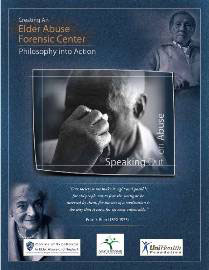 |
The manual and DVD toolkit provides any agency that hopes to develop an Elder Abuse Forensic Center (EAFC) with the preliminary structure and ideas that have proven useful to those who have already embarked on this endeavor.
Creating an Elder Abuse Forensic Center manual and companion DVD addresses:
- What are the benefits?
- Tips from practitioners who started their own Centers
- Multidisciplinary considerations and logistical help
Purchase these materials from Terra Nova Films.
View all sample forms from the Appendices (PDF).
Selection of Sample Materials:
- Sample Case Presentation Format
- Sample Forensic Center Meeting Agenda
- Collaborative Agreement for EAFC
- Medical Assessment Template
- Psychological Consultation Report Template
- HIPAA letter from Office of Civil Rights on releasing medical information to Adult Protective Services
For journal articles about the Elder Abuse Forensic Center of Orange County and related research studies, visit the Publications page.
Elder Abuse Forensic Center in the Media
- Elder Abuse--Inside E Street TV Program, February 6, 2012
- "Nation’s First Elder Abuse Forensic Center Wins U.S. Attorney General’s Award" BIFOCAL: Bar Associations in Focus on Aging & the Law, Journal of the American Bar Association, Commission on Law and Aging, Mar-Apr 2011, Special Elder Abuse Issue (Vol. 32, No. 4, p. 57)
- “Forensic Skills Seek to Uncover Elder Abuse” by Jane Gross, New York Times, Article and audio slide show, September 27, 2006
- Le CSI des vieux with Frederic Arnould from Le Telejournal, Radio-Canada, Canadian Broadcasting Company (in French), 4-minute streaming video features several members of the Elder Abuse Forensic Center, December 18, 2006
- Elder Abuse Forensic Center playlist on YouTube
